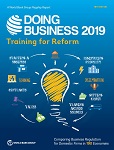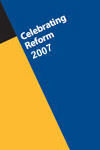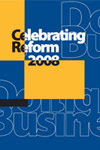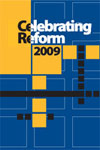
Starting a Business and Registering Property: The role of training in facilitating entreprenuership and property rights
By keeping records of a company’s formal existence and of land ownership rights, business and land registries play a critical role in any economy’s business environment. Registering a new company or a property right is best done when registry officers are well trained and knowledgeable. A combination of targeted training and effective communication to both civil servants and the public can improve the overall quality of the public goods and services provided by business and land registries.

Registering property: Using information to curb corruption
Registered property rights are necessary to support investment, productivity and growth. Registering property indicator examines the steps, time and cost involved in registering property. In addition, the topic also measures the quality of the land administration system in each economy. Transparency is a key element of the quality of land administration systems. It increases the efficiency of the real estate market and eliminates asymmetrical information between users and officials with respect to services provided by the land administration. In 2013, Transparency International reported that one in five users of land services globally claimed to have paid a bribe for services such as registering a land title or obtaining updated property ownership information. Lack of transparency can also lead to land record fraud or alteration, land document forgery and multiple allocations of the same plot of land Transparency is one of the most important tools for combating corruption—it is the basic pillar of enhancing the quality of land administration. Transparent systems strengthen public confidence in governments and facilitate substantial reductions in the cost of doing business. As a component of its registering property indicator set, Doing Business has measured the transparency of land administration systems for the past four years. This research has focused on whether information concerning the ownership and physical location of a property is public, whether essential information on the property transfer process is made accessible, if there is an independent and specific complaint mechanism to respond to issues raised by land registry users and whether statistics on property transfers in the largest business city of an economy are published.

Registering property: Measuring the quality of land administration systems
Doing Business collected preliminary data in 170 economies on the reliability, transparency and coverage of land registration systems and on land dispute resolution. A high quality land registration system is associated with greater access to credit, lower income inequality and a lower incidence of bribery at the land registry. The data show that examples of good practice exist in all regions of the world.

Registering property: The paths of digitization
Over the past five years 37 economies computerized their land registry. The average time required to register a property transfer in these economies fell by almost 40% while the global average only decreased by 7%. The transition from a paper-based land administration system to a digital one involves several considerations, including the legal framework, technological capabilities, and human and social factors. Once an appropriate legal framework and data system have been established, the land records can be converted into a digital format so that they are properly stored and protected from the effects of time (excessive use, moisture) or even natural disasters (floods, earthquakes). Beyond going digital, land registries can develop new services and be connected to other agencies.

Georgia: Need land administration reform? Start a revolution
In 2004, a newly elected, reform-minded government revolutionized Georgia’s land administration system—just a matter of months upon taking office. The goal was a new land registry that guaranteed transparency and efficiency. In June 2004, Georgia established a new National Agency of Public Registry, which was to be independent in its budget.

Ghana: When enough is enough (land registration)
Since independence, the citizens of Ghana have dealt with a dysfunctional land administration system. Long and expensive procedures took up to 5 years and involved 6 different agencies. Many preferred to avoid the headache, keeping their land issues within clans or tribes—unrecorded, but simpler and cheaper for them.

Egypt: How to raise revenues by lowering fees
Over the last decade, Egypt’s economy grew rapidly. But its property market remained far below its economic potential—for government revenues and as an investment vehicle for citizens. In fact, as recently as 2005, 90% of properties in Egypt were either unregistered or registered at underestimated values.

Honduras: Slashing the time to register property from 18 months to 15 days
Honduras’s property-registry system was obsolete and created instability in the real estate market. The same property could be registered 2 or more times by different owners, leading to painful litigation. Furthermore, the system was inefficient. It could take 1 to 2 years to complete a property registration. The system was ripe for reform.

Belarus: The story of property reform
In the late 1990s, the Belarusian government set out to streamline the nation’s onerous property registration system. To this end, a “one-stop shop” was created to help make Belarus’ property registration system one of the most efficient and sophisticated in the world.

China: New property rights law
After a record 14 years of consultation, China’s long awaited new Property Rights Law was finally passed on March 16, 2007. For the first time the law offered equal protection to socialist public property and private property.

Macedonia FYR: Major changes spurred by regional integration
Regional integration efforts such as the accession process of the European Union can help drive reforms in business regulation. This has been the case in FYR Macedonia, which launched a comprehensive reform agenda after applying for EU membership. Its reform agenda has been driven largely by requirements to ensure that the country’s laws are in line with the EU legal framework. Equally important has been the desire to attract investment and develop business activity to create jobs and achieve economic growth.

Mexico: Unleashing regulatory reform at the local level
Mexico’s 31 states and 2,441 municipalities, along with Mexico City, have extensive regulatory powers, allowing them to design, implement and enforce regulations. So regulatory reform has required not only horizontal coordination among ministries, agencies, and legislative and judicial bodies at the federal level, but vertical coordination with entities at the state and municipal levels. The regulatory reform initiative in Mexico has used an exercise of benchmarking business regulation in all 31 states and Mexico City to support this coordination and stimulate change.

United Kingdom: Rethinking regulation
In the United Kingdom in 2005–10 a program reduced the burden of regulatory compliance on businesses by 25% according to the government. That amounted to savings for firms equivalent to £3.5 billion. New initiatives are under way, such as the "one in, one out" system and the Red Tape Challenge.

Egypt: How efficiently Is capital created? Evidence from property registration reform
Many developed countries, and countries on their way toward development, have simple, inexpensive and fast property registration processes. Low property registration fees encourage every property holder to receive a formal title. The poor especially benefit, because they can use their property as collateral, start doing business and work to achieve their dreams. This paper discusses the property registration reform in Egypt that focused on two areas: the cost and quality of procedures.

Poland: Taking on the bailiff monopoly
Krzysztof Józefowicz, Under-Secretary of State at the Ministry of Justice in Poland between December 2005 and March 2007, talks about difficulties in breaking up the bailiff monopoly. “Bailiffs are enforcement officers charged with executing judgments by seizing and selling the goods of debtors who do not pay their debts on time,” he explained. “In Poland, the bailiffs enjoy a quasi-monopoly because just one bailiff per enforcement precinct is allowed, prices are fixed by law and entry into the profession is nearly impossible. Shielded from any competitive pressures, Polish bailiffs deliver poor service and the execution of judgments in Poland is patchy at best.
